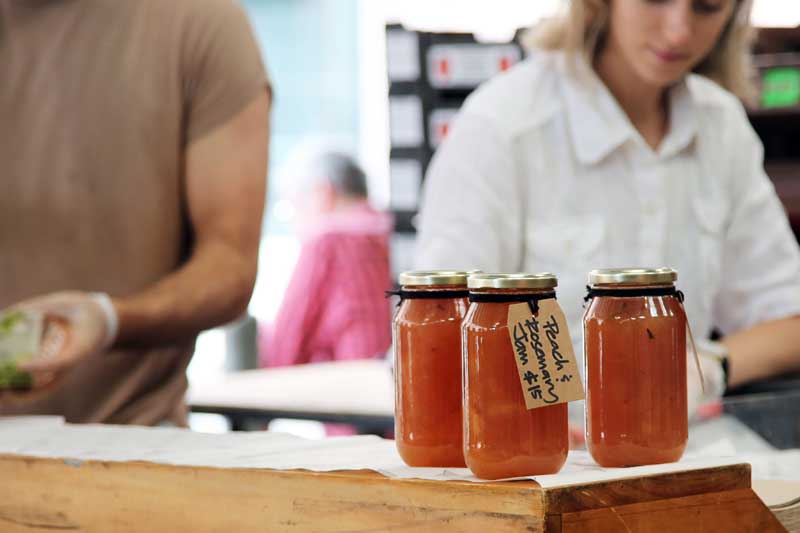As part of my coaching business, I go along with my clients to help them shop healthier; whether it’s the grocery store, a health food store, or a farmers market.
I will help them do whatever is necessary or required in order for them to learn how to eat a better, healthier diet. I have decided it would be a good thing to make that the subject of this month’s newsletter. I hope you enjoy it and as always, feel free to contact me if you have any questions.
- Shop the outer edge of the grocery store – The reason is this is where you are going to find the least processed foods – fresh fruits and veggies, lean meats, and dairy items. The center aisles should be avoided unless you’re buying whole grains, spices, or healthy oils such as Olive, Sesame or Coconut Oil.
- Shop with a grocery list – This will keep you on track and buying only the items which are healthy – as long as you put only healthy items on the list. I use an app on my phone for the shopping list, that way I don’t ever forget it at home.
- Buy fresh foods – avoid the processed foods – canned or boxed. It’s much cheaper and healthier to buy fresh fruits and veggies. Try to avoid buying anything that has more than 4 ingredients – it means it’s highly processed and is generally loaded with toxic chemicals.
- Buy fruits and veggies that are in season – When buying in season you’ll buy fresher and it will cost you less to buy them. Also, I generally buy things at various levels of ripeness and then let them ripen on the counter.
- Avoid buying canned vegetables – There is a preservative in the cans that’s not healthy for us. If you must buy canned buy organic, you will avoid most of the preservatives.
- Read labels – If you happen to venture into the center aisles and something grabs your attention, read the labels and beware of hidden sugars as well as gluten. If it says “sugar free” but the label says dextrose or sucrose or anything that ends in an “ose” – it has sugar in it. Store bought salad dressings and many condiments will have gluten in them, so avoid them if possible.
- Buy grass fed beef, chicken or wild caught fish – The reason for this is much of the cattle and chickens raised in the US are not fed a healthy diet, so it’s best to buy grass fed when possible. If you can’t find grass fed, or it’s priced outside of your budget –buy lean beef, and try to avoid fat as much as possible. It’s the same with fish – the wild caught is fed a natural diet and is much better for you – avoid any fish that says, “farm raised” on the label.
- Dairy, Eggs, and Butter – I could write a book on this aisle, but I’ll keep it brief, or at least try to. If possible anything that comes from this aisle should be from grass fed cows, and organic. When it comes to milk the best choice is “Unsweetened Almond or Cashew Milk.” Milk from cows is loaded with hormones and preservatives that are just not good for you, not to mention they usually have sugars added to make you addicted to the milk. Oh, and don’t be fooled by the ads that say, “Milk, it does a body good”, thinking you need the calcium. Studies have shown milk will actually leach calcium out of your bones, rather than putting calcium in them. When buying yogurt buy the Organic Greek Unflavored and add fresh fruit to it for added sweetness, instead of buying the kind with fruit on the bottom – that kind is loaded with sugar. Greek Yogurt can also be used in place of sour cream, cream cheese, and ricotta cheese in many recipes. When buying cheese, read the labels and buy the brand that has the least amount of ingredients, or just use it in very small quantities when needed for a recipe. Eggs – Buy Organic or from cage free chickens. Brown eggs are best and if it says “omega 3” added that’s even better. Butter – Many of the butters you see in the grocery store are loaded with preservatives, and are generally not good for you. If at all possible buy an Organic butter or butter made from Olive Oil. Again, read the label and buy the best you can afford.
- Oils – Avoid all oils with the exception of Olive, Sesame, or Coconut Oil. Many of the oils in the grocery store are loaded with “trans fats”; do not use Canola Oil or any type of Canola Oil blend. Some other oils are good, just read the labels, and check for “trans fats”.
- Bread and baked goods – Again I will try to be brief. So much of what you find on the aisles of the store are loaded with preservatives and sugar. They are generally made from wheat or rye flour, and have gluten in them. Gluten as well as sugar causes all kinds of health problems – digestive issues, high blood pressure, joint pain, diabetes, and many others. Best if you just avoid these items all together, unless you can buy gluten and sugar free from the health food store. If you like wraps you can buy a corn tortilla – those are generally gluten free and will be marked as such, but be sure you read the label just to make sure.
I hope this article has been helpful, feel free to contact me if you have any questions.

